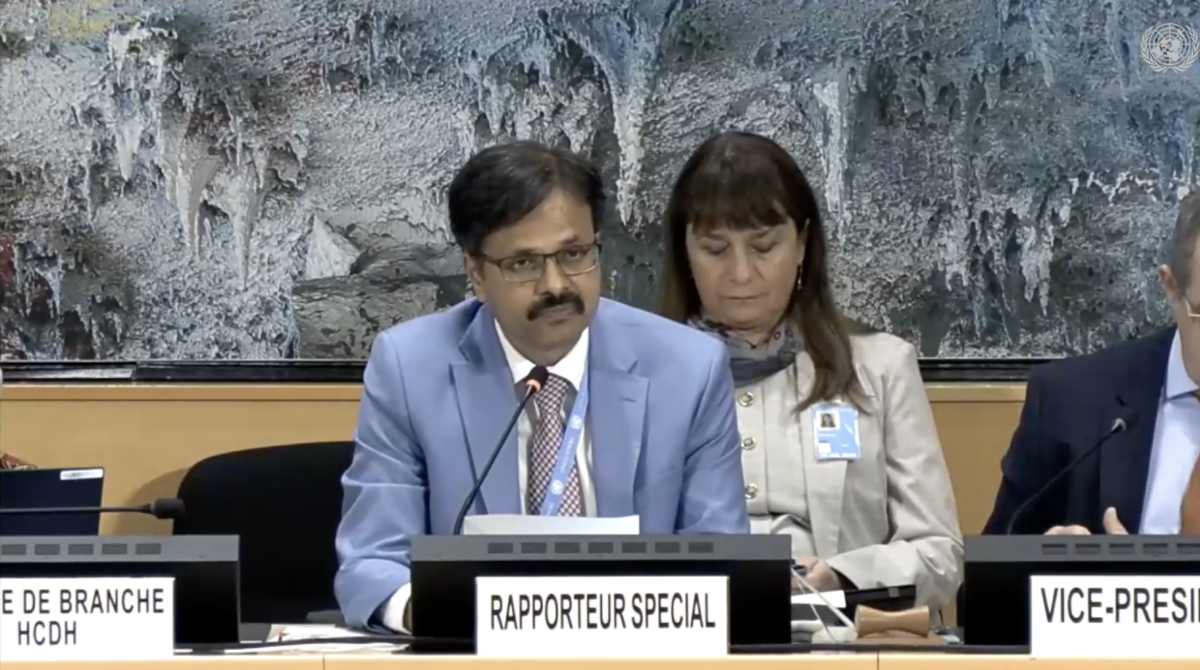
The Universal Right to Development… and the Many Obstacles Faced by Women Towards It
The 60th Session of the Human Rights Council
8 September – 8 October 2025
Item 3: Interactive Dialogue with the Special Rapporteur on the right to development
10-12 September 2025
by Arwa Akbar / GICJ
Executive Summary
On 10 and 12 September 2025, the 6th and 7th Meetings of the 60th session of Human Right Council took place, during which the discussion on Item 3: Interactive Dialogue with the Special Rapporteur on the right to development occurred. In his discussion, the Special Rapporteur, Mr. Surya Deva, presented the findings of his report on the Nexus between gender equality and the right to development (A/HRC/60/25) and the Special Rapporteur’s visit to Honduras (A/HRC/60/25/Add.1). He emphasised the mutually-reinforcing nature of the right to development and gender equality.
During the dialogue, several groups of countries voiced their support for his mandate and report, demonstrating their commitment towards the nexus. Calls for a unified international instrument to ensure accountability were echoed throughout the Council, in an effort to end impunity.
Geneva International Centre for Justice (GICJ) supports measures towards gender equality and the right to development, affirming that both mechanisms must be achieved to ensure the right to development for all. We encourage the Special Rapporteur to continue his mandate.
Background
‘Billions of people in all parts of the world have been left behind and are yet to see their right to development realised,’ the United Nations reports [1]. Unfortunately, this claim is well-founded. The international body’s research in its 2015 Millennium Development Goals’ report, reveals bitter truths, such as the statistic that 880 million people continue to live in areas that constitute slums. Furthermore, 800 million people live in extreme poverty, suffering from hunger with an alarming 160 million children under the age of five, experiencing the devastating effects of malnutrition. These are crucial years for a child’s development, with UNICEF stating that: ‘Early childhood, which spans the period up to 8 years of age, is critical for cognitive, social, emotional and physical development, [2].’ Such a poignant statement is backed by science, as a child’s developing brain is highly susceptible to external interference, with a child’s interactions with the outside world and factors such as, their home environment, accessibility to education and what UNICEF refers to as ‘the overall development status of children,’ acting as tools which work to sculpt and mead the clay that is a child’s brain. UNICEF explains how ‘billions of integrated neural circuits are established through the interaction of genetics, environment and experience,’ [3].
Therefore, the right to development is a fundamental human right, as enshrined upon the United Nations Declaration on the Right to Development (DDRT), henceforth referred to as the Declaration, adopted on 4 December, 1986.
The Declaration defines development as the ‘comprehensive economic, social, cultural and political process, which aims at the constant improvement of the well-being of the entire population and of all individuals on the basis of their active, free and meaningful participation in development and in the fair distribution of benefits resulting therefrom,’ [4]. The Declaration demonstrates how rights are mutually reinforcing, with the successful achievement of development for all, contributing to advancement and consolidation of other fundamental rights; including but not limited to, the right to self-determination in the United Nations Charter and the right to basic freedoms, as outlined in the Universal Declaration of Human Rights (UDHR).
Additionally, the significance of attaining ‘equal opportunities and equitable economic resources’ [5] for all citizens contributes to the fortification of State authorities' social contract with their citizens, as this provides avenues for the enhancement of civil society through the individual strengthening of capabilities. This leads to an overall more unified framework within States, extending to a more unified global framework, promoting peace. As such, it is the sacrosanct duty of all States to contribute the necessary resources and facilitate the level of international cooperation needed to fulfil the right to development for all.
On 29 September 2016, the Human Rights Council adopted resolution 33/14, which illustrates the UN’s willingness to uphold the right to development as paramount, with the installation of a mandate of the Special Rapporteur on the right to development [6]. The current Special Rapporteur is Mr. Surya Deva, who commenced his mandate on 1 May 2023 [7]. He led the interactive dialogue on the right to development during the 6th and 7th Meetings of the 60th session of Human Rights Council.
Summary of the Special Rapporteur’s visit to Honduras (A/HRC/60/25/Add.1)
The Special Rapporteur Mr. Surya Deva documented his visit to Honduras, (A/HRC/60/25/Add.1) [8], from 11 to 21 November 2024, citing the main objectives of the visit as being ‘to gain first-hand understanding of the realization of the right to development as well as the key challenges related to the promotion, protection and fulfilment of the right to development in the context of the implementation of the 2030 Agenda for Sustainable Development.’ As such, his report aims to contextualise the actual situation in Honduras, regarding various thematic issues. Upon his observations, the Special Reporteur offered recommendations to the Government, in an effort to contribute towards the fruition of Honduran civil society.
The report noted both areas of progress and areas needing improvement. In some aspects, the state successfully advanced the principles of the Declaration, for instance through the implementation of the Sustainable Development Goals (SDGs), notably with the adoption of innovative strategies that seek to ensure social protections. The “Better Life” voucher programme is an example of this, as it seeks to tackle Goal 1 of the SDGs, leading to poverty alleviation by acting as a conditional cash transfer, benefitting families in extreme poverty under the condition that they adhere to the routine practices of self-fulfilment and self-care conscribed to them. Such practices include, attending mandatory health-ups as a pregnant woman or young child.
Despite such triumphant and innovative solutions adopted by the State, the Special Rapporteur’s report identifies the continued struggles of those living in poverty, with the high poverty headcount ratio of $3.65 per day, and the widespread nature of chronic malnutrition in the country, affecting one in four children. The key thematic issues outlined in the report were: the right to development of Indigenous Peoples, the gender dimensions of the right to development, land rights and privatization and social conflicts, environmental pollution and climate change, participation in decision-making processes, and role of businesses. The recommendations to the state ranged from the necessity to strengthen state institutions to management of land, with importance denoted to securing land titles for Indigenous communities.
Summary of the Special Rapporteur’s Report on the Nexus between gender equality and the right to development (A/HRC/60/25)
The Special Rapporteur’s Report on the Nexus between gender equality and the right to development (A/HRC/60/25) [9], focuses on the ‘mutually-reinforcing’ nature of both mechanisms; whereby the advancement of one leads to the advancement of the other. Mr. Surya Deva uses a feminist-lens as he explores the intersectional nature of development, focusing on women’s and girls’ perspectives. The report commences by acknowledging the universality of the right to development, stating that it is ‘the human right of every human person’. Despite this, gendered barriers continue to litter the landscape that is meant to be gender equality, with barriers multiplying in the optimal patriarchal-normative environment that women and children across the world are subject to grow in. The report references The Gender Snapshot 2024, which reports that SDG 5, gender equality, has yet to be fully implemented, with meaningful progress only stemming from a miniscule amount of its targets being on track to a positive trajectory, yet still remaining unfulfilled.
The report emphasises the importance of the nexus, citing three major reasons:
- The lack of attention by the international community on the nexus, with misconceptions arising as a resultant that wrongfully perceive either mechanism as being in opposition to each other.
- 2025 marks the 13th anniversary of the Beijing Declaration and Platform for Action’s adoption.
- Progress towards gender equality is becoming subverted with ‘backlash against’ it. As the report states: ‘It is critical to reinforce the importance of gender equality as a cross-cutting foundational right that should not fluctuate with changes in the political winds.’
The report successfully achieves the Special Rapporteur’s main articulated objectives, with:
- The effective description of the nexus:
The report defines each mechanism before elaborating on the nexus. Gender equality is defined in terms of international law, seen as ‘a foundational and cross-cutting norm of most international normative standards on human rights and the right to development.’ The right to development is seen as encompassing four realms of ‘economic, social, cultural and political development.’ He details how each aspect of the right of development can be positively impacted by gender equality. Some notable findings include his observation on the relationship between economic development and gender equality, citing that, ‘There is evidence that gender equality measures, such as gender-responsive budgeting, result directly in the economic empowerment of women and girls.’ He notes that in regards to social development, women and girls are susceptible to being victims of violence in both the private and public sphere. The report states that: ‘Patriarchal social norms should be dismantled, including by engaging men and boys in gender equality campaigns.’ Regarding cultural development, women and girls are continually reduced to stereotypes across all areas of cultures; including but not limited to, fashion and advertisement. The report explains how this works to reinforce, in the Special Rapporteur’s own writing, ‘gendered social norms.’ On the topic of political development, gendered barriers prevent women from exercising their political potential.
- The explanation of how achieving gender equality would lead to the right to development in all sectors:
In his report, the Special Rapporteur defines women and girls as ‘agents of change,’ when given the opportunity to adopt this role, with the ability to ‘contribute to a more inclusive, peaceful and sustainable world.’ The report notes that: ‘The current economic development model is leaving too many people behind. There is evidence suggesting that, if women are at the helm, they contribute to more inclusive growth.’ References to case studies in Rwanda and Ukraine are used to articulate this, demonstrating the transformative potential of innovative reforms, spearheaded by women. The report also explores how increased women leadership can contribute towards fostering a more peaceful world. The report states that, ‘Militarization and conflicts in the world are related directly to masculine leadership.’ Military expenditure is observed as being a ‘major obstacle to peace’. The report furthers the notion that ‘There is evidence that women leaders contribute to more sustainable economies.’ This is seen with the advent of women in parliamentary position leading to the ratification of more environmental treaties than their male counterparts.
- The explanation of how achievement of the right of development would lead to gender equality:
The report states that: ‘various aspects of the right to development, including the collective dimension, participation in decision-making, fair distribution, international cooperation and intersectionality, should be leveraged to achieve substantive gender equality in society.’ The report illuminates the ‘transformative nature’ of the right to development. The ability for the right’s achievement to contribute towards gender equality is briefly illustrated in the following diagram elucidated by the Special Rapporteur in his report:
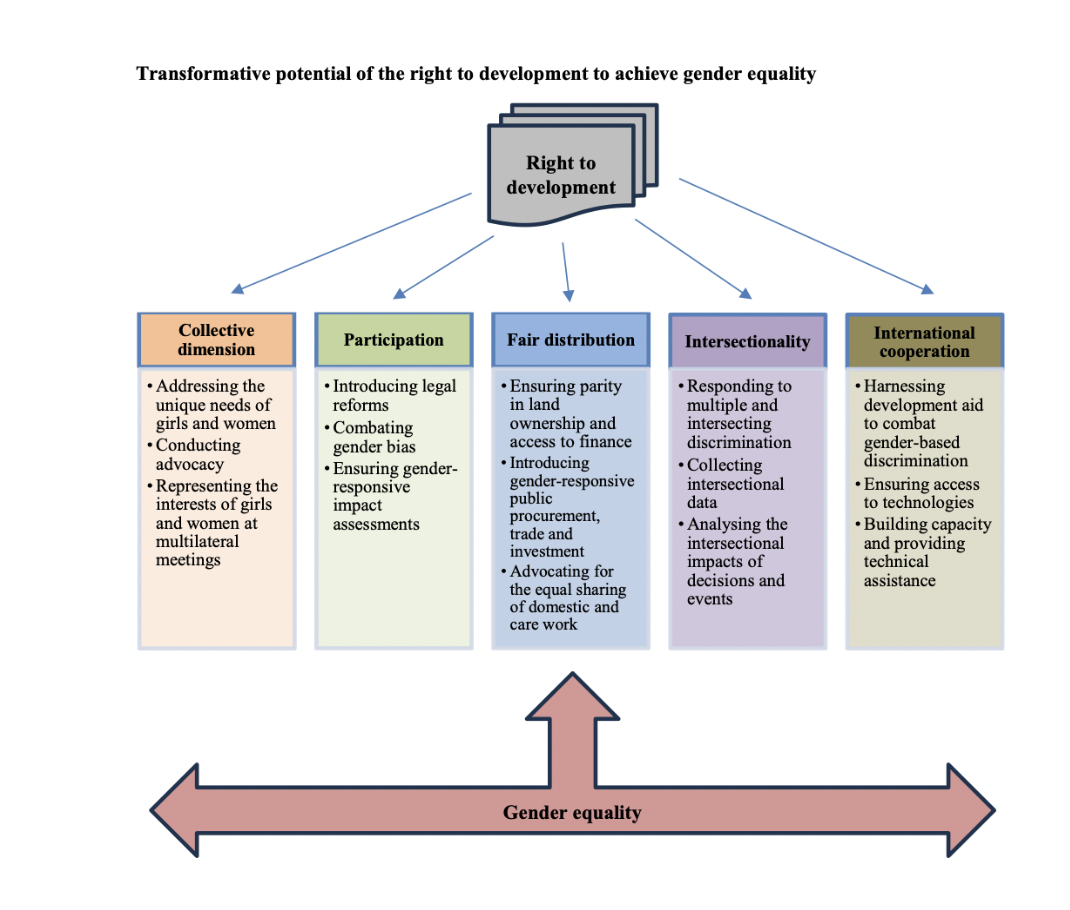
The Special Rapporteur concludes his report by reiterating that: ‘Without the achievement of gender equality, the right to development of every human being cannot be realized,’ The report ends by offering a series of recommendations for States and businesses to implement, in hopes of alleviating gender inequality and providing women and girls with the necessary tools to assume their roles as ‘agents of change’ which will beneficially lead to the achievement of the right to development for all.
Summary of the Interactive Dialogue
The chief themes that were echoed throughout the discussion were non-repetition and transnational justice. State representative after state representative continued to express support for the Special Rapporteur’s recommendations. The need to eliminate the culture of impunity that continues to roam across the globe, was highlighted as a necessary step, with its potential in facilitating the re-dignification and distribution of reparations to victims. Potential pathways to achieve this, included the documentation of human rights violations, ensuring accountability and non-recurrence. The international community stressed the paramountcy of the principles of truth and justice to be enshrined upon transnational justice mechanisms, which would not only compensate victims and their families, but further aid in the elimination of impunity. The overarching message from Mr. Surya Deva’s report, A/HRC/60/25, was re-affirmed throughout, with state representatives reaching consensus that it is women who experience the vastly disproportionate effects of prevailing global issues, further preventing them from achieving the right to development that all individuals are entitled to.
Opening Statement
Mr. Surya Deva, Special Rapporteur on the Right to Development
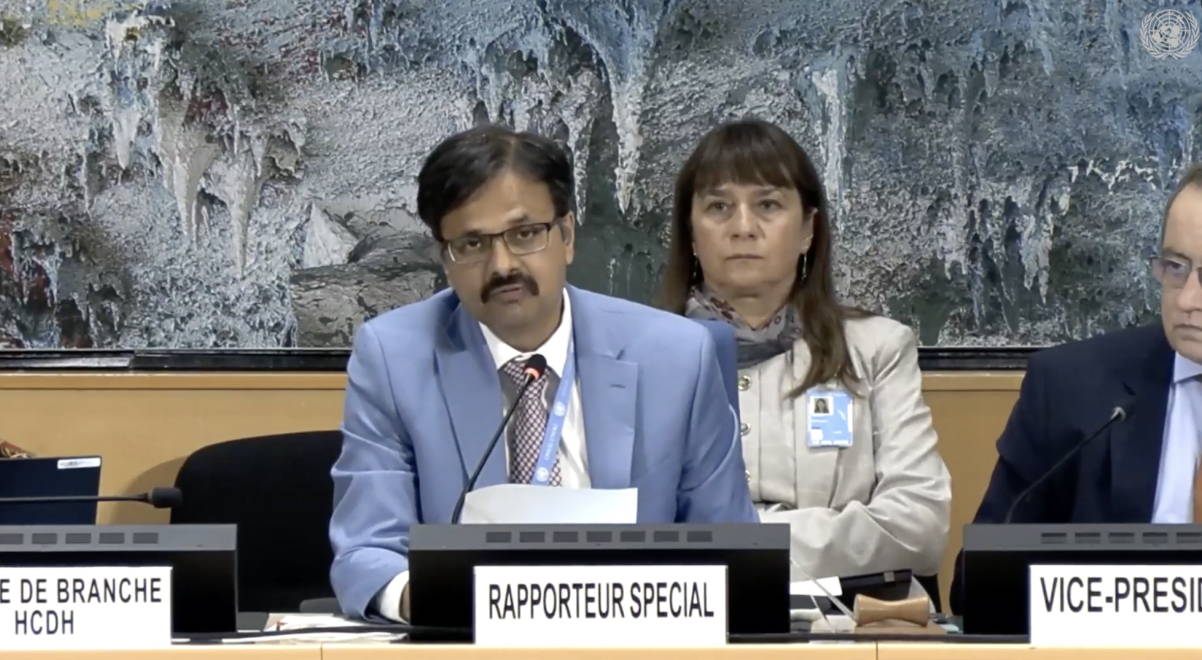
The Special Rapporteur, Mr. Surya Deva, commenced the discussion by confronting the long-held assumption that hinders the international community from preventing progress towards the achievement of gender equality and the right development. The assumption that choosing to advance either the right to development or gender equality, will stunt the progression of the other. He asserted that the right to development and gender equality are mutually-reinforcing, as he sought to demystify the warped ideology that they act in opposition to each other. He reaffirmed the findings of his report, reiterating the importance of advocating for the self-determination of women and girls, which can work to improve sectors of development. He stated that ‘women and girls should not be viewed as recipients of empowerment,’ but rather as ‘agents as change.’ He called on the competent bodies ‘to leverage the transformative nature of the right to development to address the root causes of gender inequality.’ He thanked the Government of Honduras for their transparency and openness towards his November 2024 visit, citing their commitment towards the right to development and steps taken, such as, free school-meals and bans on extractive exploitation licences. However, the Mr. Surya Deva notes that challenges persist with the ‘systematic discrimination against Indigenous Peoples and Afro-Hondurians, law and order problems, land conflicts, weak environmental governantes, climate crisis, attacks against human rights defenders, a high national debt burden and multiple arbitration claims by foreign investors.’ He furthers the contents of his report, stating the recommendations made to the Government, to ‘operationalise a model of planet-centred participatory development which balances economic growth with social inclusion and environmental sustainability.’
Statements of the Concerned Countries
Honduras (Country concerned), Mr. Héctor Longino Becerra
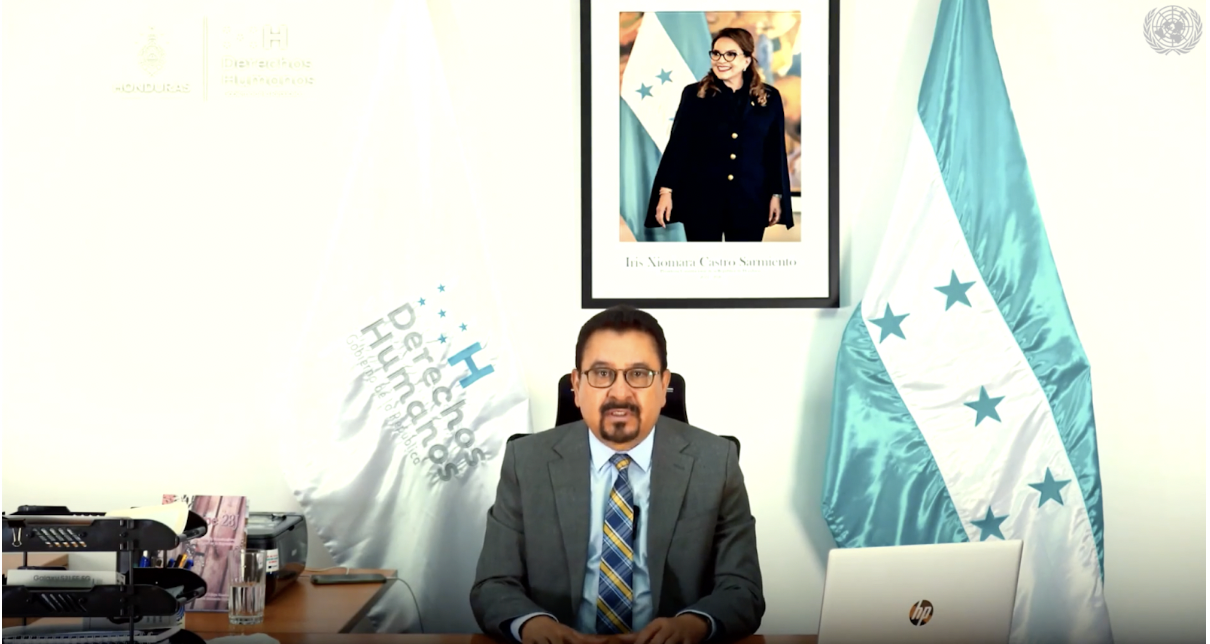
Mr. Héctor Longino Becerra expresses his appreciation towards the Interactive dialogue with the Special Rapporteur, noting its potential to aid the country in its development. He recognises Honduras ‘meaning progress,’ while also acknowledging the continued ‘meaningful challenges.’ He focuses on the country’s 2009 coup d'état and how the resultant‘excess of benefits’ attributed to the business sector, continue to entrench the country into corruption and impunity that continue to derail the country’s progress. Furthermore,he states that the Government and state institutions continue to reaffirm their commitment towards human rights with steps taken from 2022 which aim to ‘to strengthen the constitutional rule of law and transforming the development model to one that ensures equality and well-being of all people.’ Progress is further highlighted with figures such as the reduction of poverty from 74% in 2001 to 64% in 2004, and the reduction in extreme poverty from 66% in 2001 to 52% in 2004. In regards to the rights of Indigenous Peoples and their land, he notes the creation of a technical roundtable to allow for ‘the participation of civil society,’ and an ‘interdisciplinary group of independent experts,’ was created. Regarding gender equality, he states ‘we saw the approval of a geo-referencing tool for the national system for country wide care’. Further meaningful progress was noted in relations to the Sustainable Development Goals, with SGD 3: Good Health and Well-Being, witnessed with the country’s initiative to build 8 hospitals, SGD 4: Quality Education, with 247 municipalities ‘declared territories free of illiteracy,’ and SGD 11: Sustainable Cities and Communities and SGD 7: Affordable and Clean Energy, as the country has undergone the de-fossilisation of its energy matrix, using 64% non-fossil energies. He concludes his statement by conveying the State’s willingness towards necessary visits and special procedures, signifying its commitment towards international cooperation.
Statements Delivered on Behalf of Groups of States
Lithuania on behalf of a group of countries
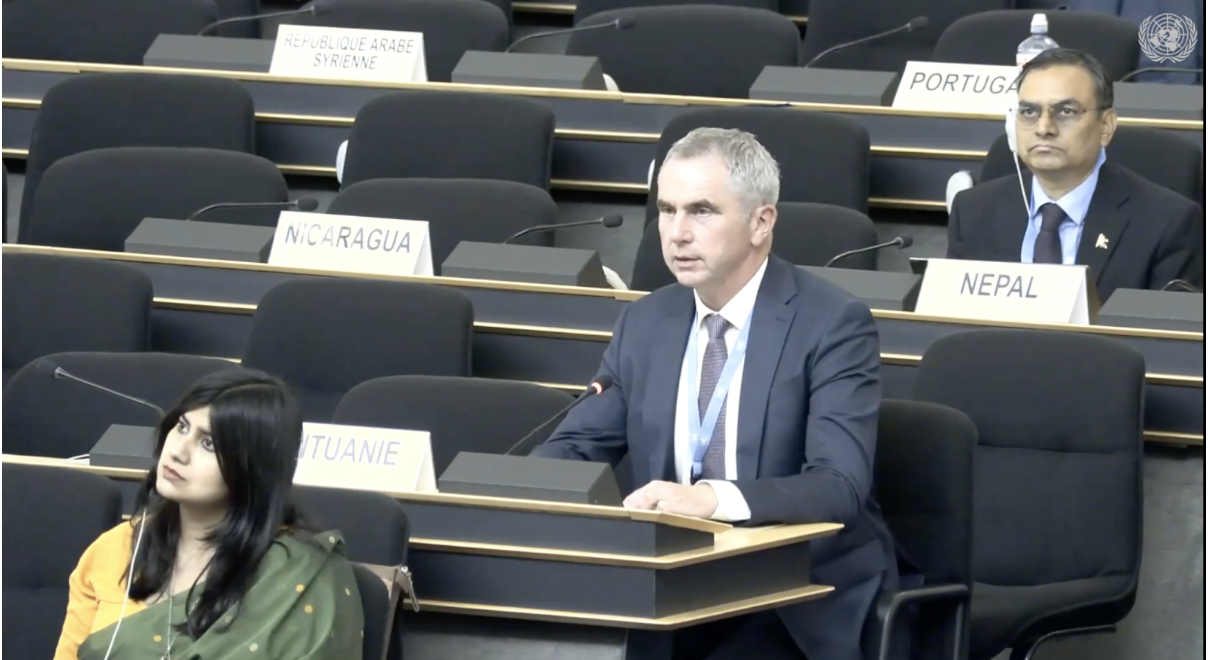
Lithuania emphasises that ‘development policies must ensure that growth is inclusive’. They referenced the Special Rapporteur’s report, conveying to his dismay that despite being the most affected by such policies, women and girls face the disproportionate effects of various issues, further derailing their pathways towards achieving the right to development. He notes forced marriages as one of the many issues that continually prevents women and girls from exercising their right to development. They asked the Special Rapporteur: ‘To address gender bias in artificial intelligence systems, what measures should States take towards responsibly governed AI systems that support inclusive development?’
Kuwait on behalf of the Cooperation Council for the Arab States of the Gulf
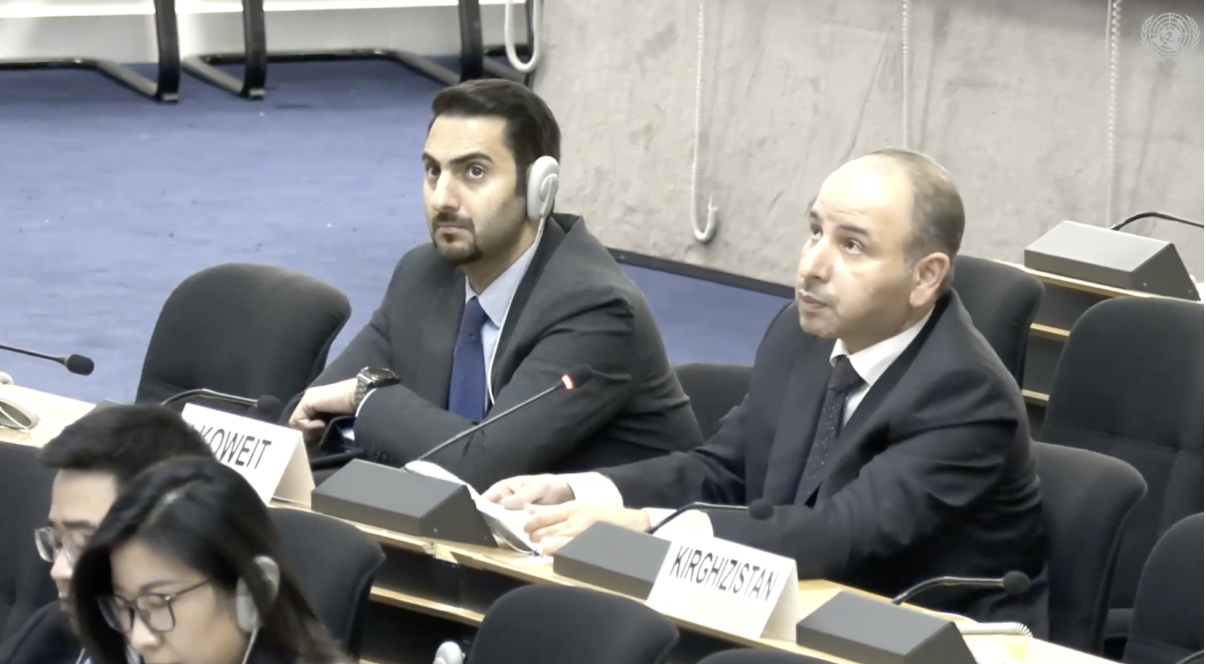
Kuwait opened by stating that ‘GCC would like to reaffirm its attachment to development as a fundamental human right.’ They emphasised the need to remove barriers and limitations to this right. They stated, on behalf of the GCC, ‘For us, the family remains the fundamental unit of society and it is for this reason, we also reject all concepts and all terminology that is not internationally agreed upon to include religious specificities and cultural specificities.’ This statement sought to extend equality to include all groups, as the GCC affirmed its commitment towards gender equality and highlighted the importance of extending such sentiments towards religion and culture.
European Union
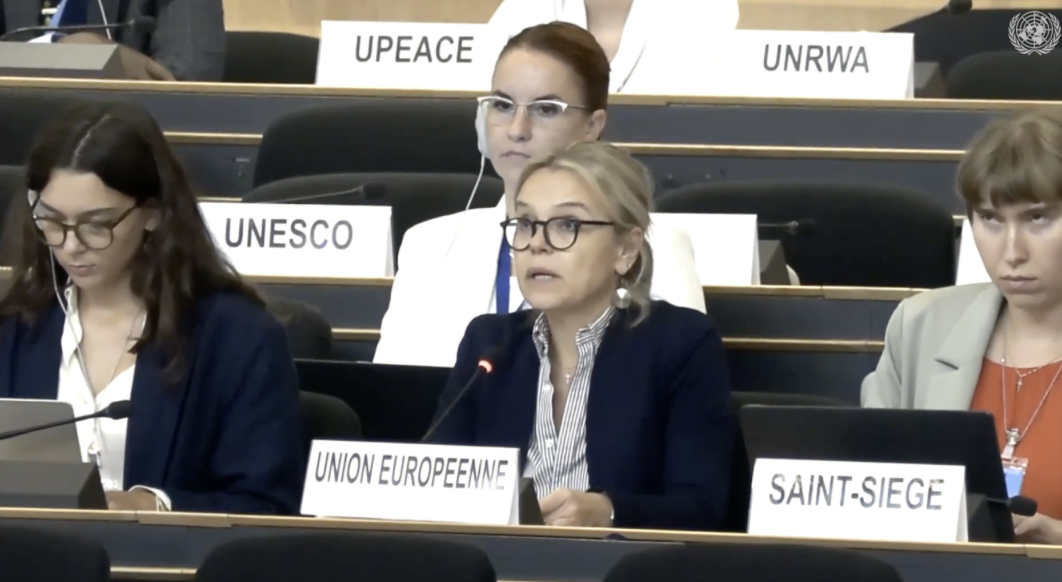
The European Union affirmed that ‘gender equality is a core value of the EU, enshrined in the Treaty of the European Union and the Charter of Fundamental Rights of the European Union.’ They cited EU legislation that works towards alleviating the issue of gender inequality. Moreover, they emphasised the universality of the right to development. They concluded their statement with a question to the Rapporteur: ‘Mr. Special Rapporteur in your report, in your report you recommend that States and other actors pay attention to the nexus between gender equality and the right to development, how do you see the Council’s contribution in that regard?’
Pakistan on behalf of the Organization of Islamic Cooperation (OIC)
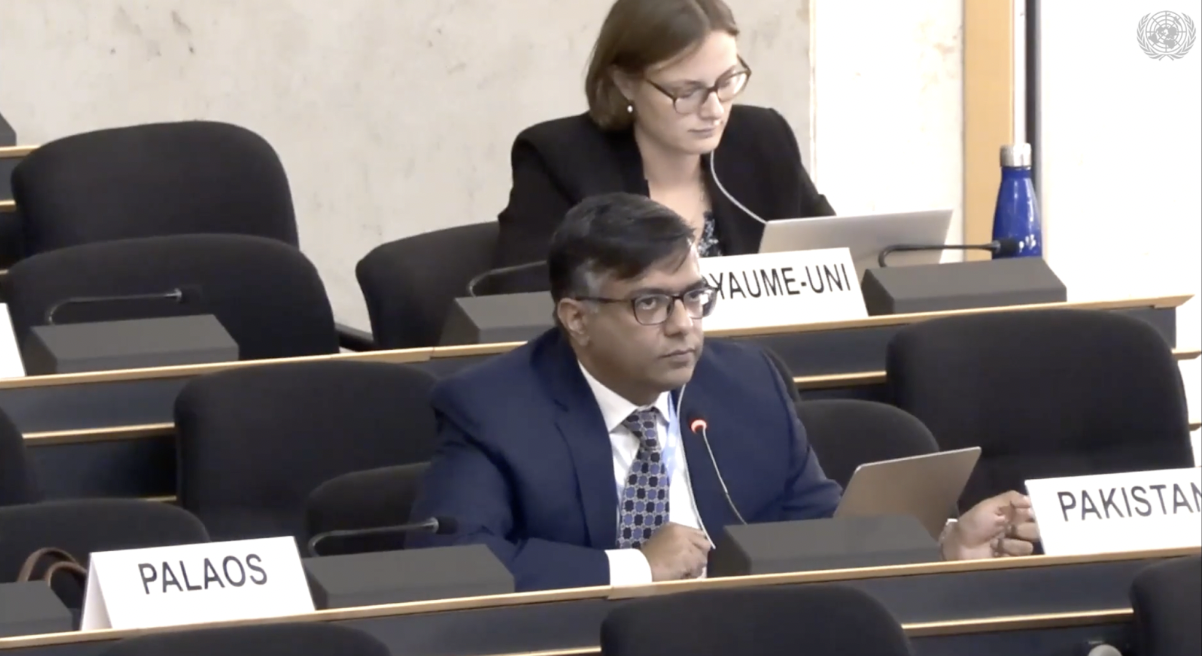
Pakistan thanked the Special Rapporteur for his report and stated that the OIC welcomed the Special Rapporteur. They stated that ‘The OIC reaffirms its commitment to the realisation and enjoyment of the right to development by everyone, everywhere.’ They noted the paramountcy of championing women’s and girl’s rights, noting its ability to ‘operationalise this vital human right,’ referring to the right of development. They bring attention to the disproportionate effects of armed conflict on women and girls, citing that women, girls and children represent two thirds of those killed in the Occupied Palestinian Territories. He concludes by stating, ‘the greater integration of the right to development into the international human rights framework remains key, upholding the indivisibility, interdependence and interrelatedness of all human rights. International cooperation, development support and reform of the international financial architecture as essential pillars in pursuit of all human rights, sustainable development and meaningful gender equality.’
Ghana on behalf of Group of African States (African Group)
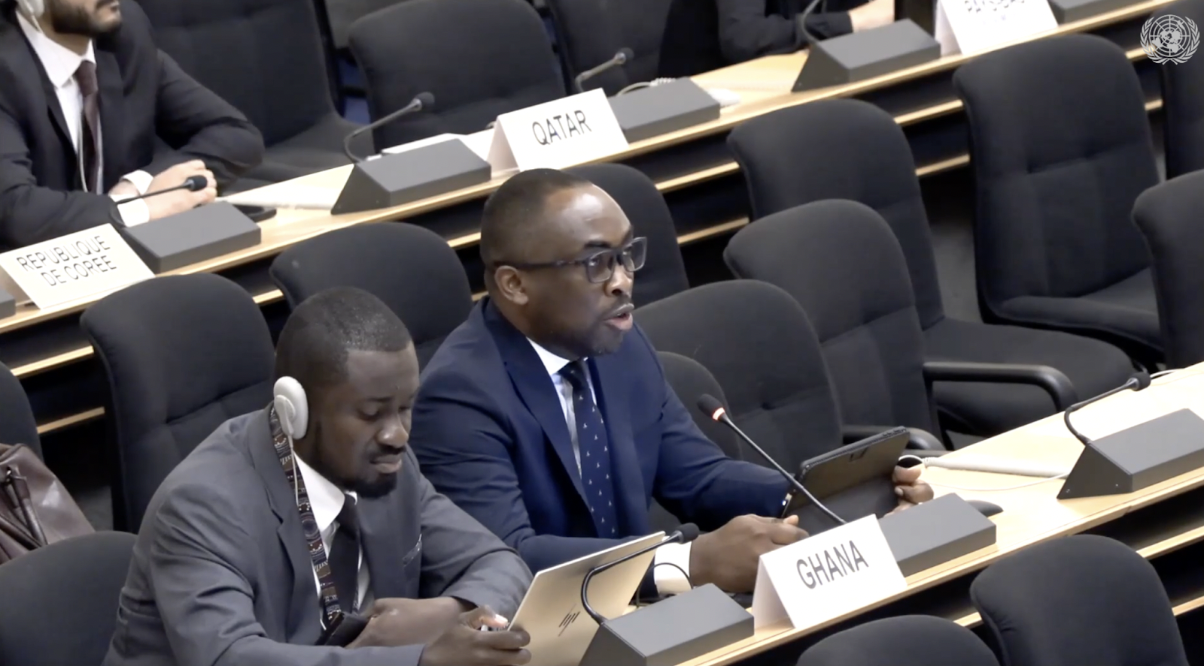
Ghana reaffirmed the African Group’s commitment towards the nexus with public policies. They state: ‘Mr. Special Rapporteur, with regard to the recommendations contained in your report, we would appreciate your views on how the United Nations, Member States, much larger institutions, and also the private sector, could further reinforce their contributions to ensure that the effective implementation of the existing and in the future international and regional instruments and agendas concerning gender equality and the right to development.’
Algeria on behalf of the Group of Arab States (Arab Group)
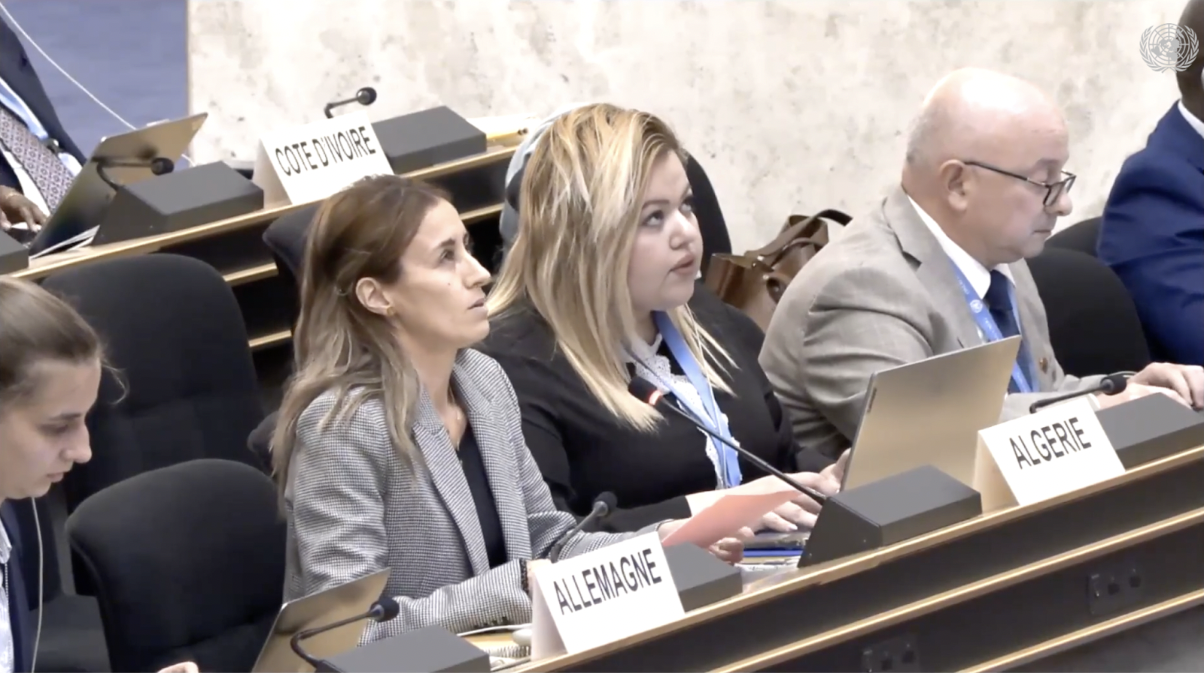
Algeria affirms that the Arab Group has taken note of the report and acknowledged the nexus, affirming that the right to development is fundamental, needing gender equality to further be ensured. They stated that, ‘Development cannot come in a context of conflict, of war, of human rights violations, because these are elements that hinder the right to development in developing countries.’ She calls on the international community to ‘guarantee technology transfer’.
Venezuela (Bolivarian Republic of) (on behalf of a group of countries)
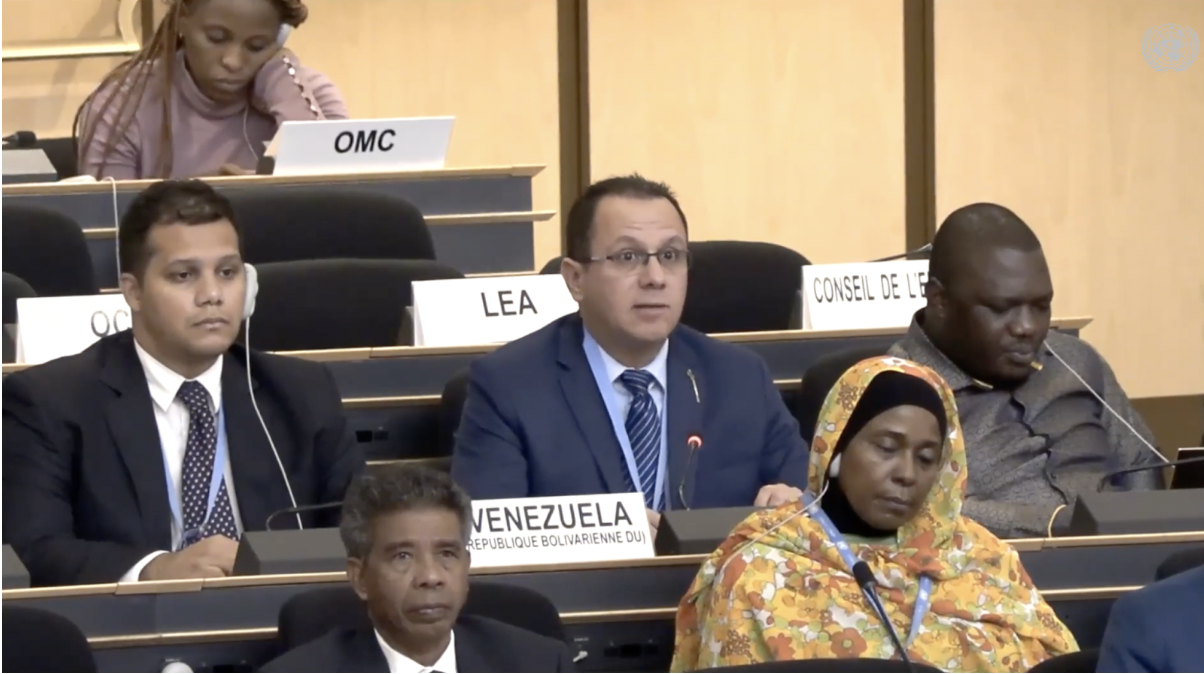
Venezuela emphasised the universality of the right to development and how barriers towards this right exist due to socio-economic inequality, citing the exploitation of South resources by the international community. They expressed the need for an international legally binding mechanism towards development and expressed his dismay towards States that continue to attempt to dominate territorially-sovereign states, in an effort to ‘not leave anyone behind’.
Uganda (on behalf of Movement of Non-Aligned Countries - NAM)
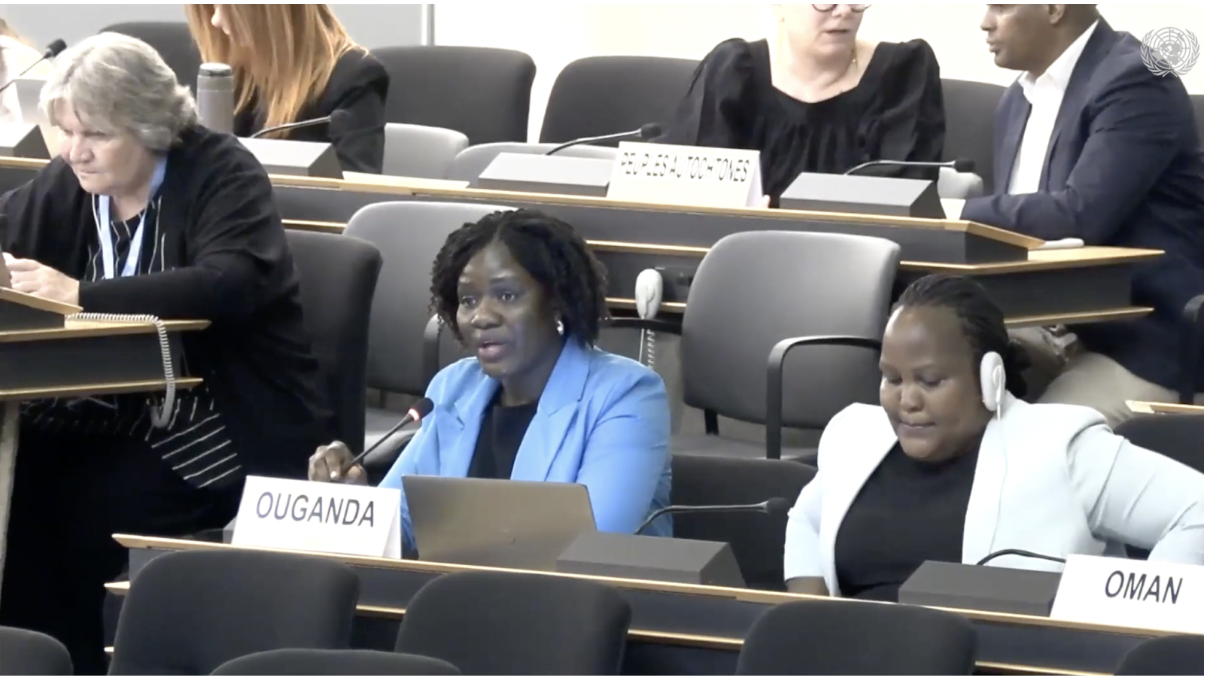
Uganda thanked the Special Rapporteur for his report and called on the Council to unanimously adopt the resolution on the right to development. She calls upon the OHCHR, on behalf of the Movement of Non-Aligned Countries, ‘to prioritise the promotion and promotion of the right to development for all our people.’ They urged the adoption of a legally binding instrument that works to improve international cooperation towards the right to development and to ensure accountability among States.
Conclusion
Mr. Surya Deva, Special Rapporteur on the Right to Development
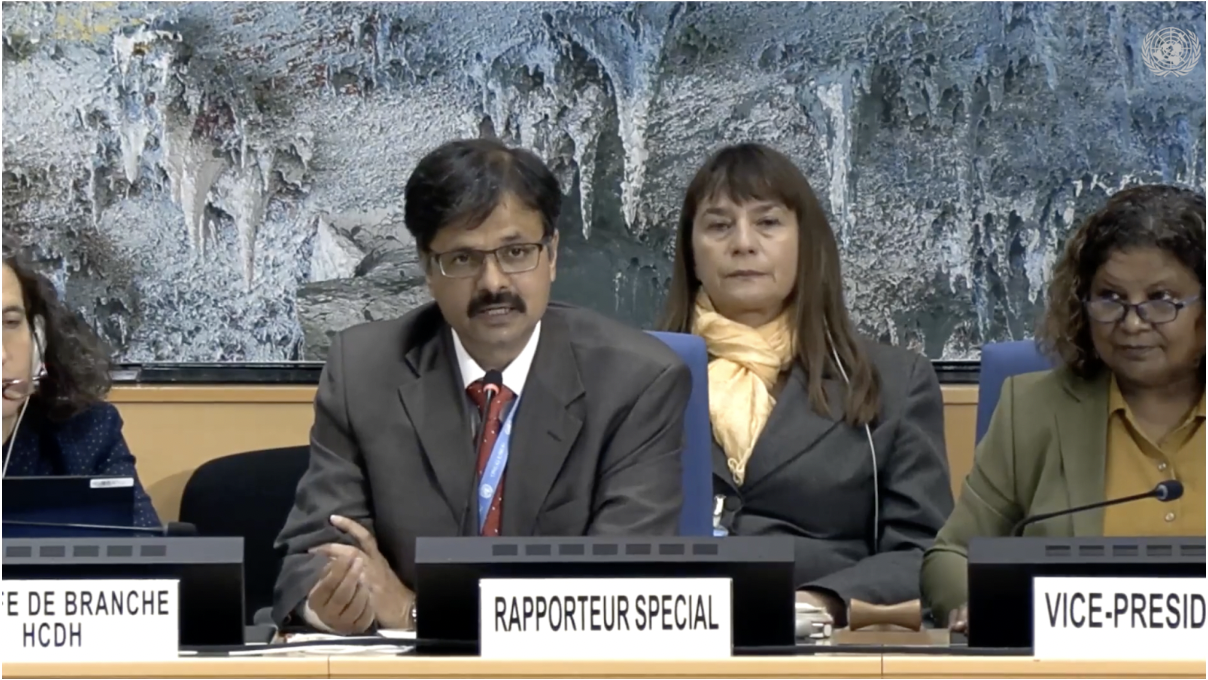
Mr. Surya Deva concludes the Interactive dialogue by noting his appreciation of the UN bodies and Member States in acknowledging the significance of the nexus. He further emphasised the importance of gender equality and the place of women and girls as ‘agents of change.’
GICJ Position
Geneva International Centre for Justice (GICJ) thanks the Special Commissioner for his report on the nexus, seen as an innovative and intersectional approach towards progress. GICJ is against gender inequality in all its forms. We recognise women as ‘agents of change,’ as Mr. Surya Deva advanced in his report.
GICJ denounces all forms of gender-based violence, discrimination and barriers. We hope that the realisation of this nexus and acknowledgement of it by the international community, will lead to a more equitable world where everyone is able to exercise their right to development.
Sources
[1] https://www.ohchr.org/en/special-procedures/sr-development
[2]https://data.unicef.org/topic/early-childhood-development/overview/
[3]https://data.unicef.org/topic/early-childhood-development/overview/
[4]https://www.ohchr.org/en/instruments-mechanisms/instruments/declaration-right-development
[5] https://www.ohchr.org/en/topic/right-development
[6] https://www.ohchr.org/en/special-procedures/sr-development/about-mandate
[7] https://www.ohchr.org/en/special-procedures/sr-development/mr-surya-deva




